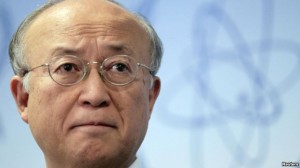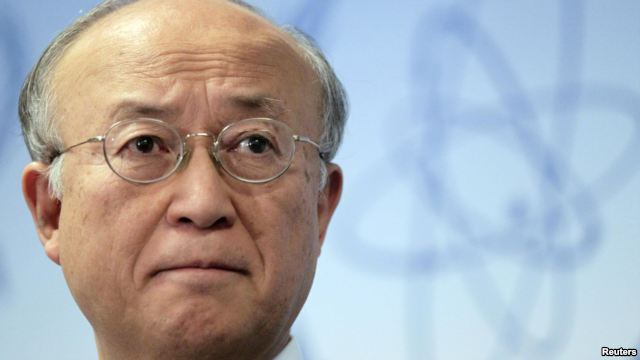
VIENNA, Nov 16 (Reuters) - Iran is set to sharply expand its uranium enrichment in an underground plant after installing all the centrifuges it was built for, a U.N. report said, a move likely to increase Western alarm about Tehran's nuclear course.
It also showed that Iran's stockpile of its most sensitive nuclear material - which could relatively quickly be processed further to bomb-grade uranium - had grown and was getting closer to an amount that could be sufficient for a nuclear weapon.
The latest quarterly International Atomic�Energy�Agency (IAEA) report on Iran came 10 days after the re-election of U.S. President Barack Obama, which raised hopes for a revival of nuclear diplomacy with Iran following speculation that Israel might attack the nuclear facilities of its arch-enemy soon.
But the U.N. watchdog's findings underlined the tough task facing world powers seeking to pressure Iran to curb atomic activity they fear is aimed at developing a nuclear weapons capability, a charge Tehran denies.
"The report paints the picture of Iran's continued lack of cooperation with the IAEA, and details its continued enrichment and installation of centrifuges in violation of U.N. Security Council resolutions," a senior Western diplomat said.
The Islamic state has put in place the nearly 2,800 centrifuges that the Fordow enrichment site, buried deep inside a mountain, was designed for, and is poised to double the number of them operating to roughly 1,400 from 700 now, according to the confidential IAEA report.
"They can be started any day. They are ready," a senior diplomat familiar with the IAEA's investigation said.
If Iran chose to dedicate the new machines to produce higher-grade uranium, it could significantly shorten the time required for any bid to build an atomic bomb. Iran says it needs to refine uranium to make reactorfuel
In another potentially worrying development for the West, Iran appears to have virtually stopped converting this uranium into making civilian reactor fuel since the previous report.
As a result, the stockpile of uranium gas refined to a fissile concentration of 20 percent increased by nearly 50 percent to 135 kg, the latest report said, still below the level of 200-250 kg experts say would be sufficient for an atomic bomb if refined further.
"This puts added pressure on the West's diplomacy with Iran, which has to operate on a tighter schedule," said research fellow Shashank Joshi at the Royal United Services Institute.
Israel has recently signalled that an attack on Iran was not imminent - after months of talk that it might be on the cards soon - by pointing to Iran's decision earlier this year to use part of its 20 percent uranium for civilian purposes.
"As Iran's 20 percent stockpile approaches around 240 kg, the Israeli sabre-rattling will resume," Joshi said.
"WINDOW OF TIME" FOR DIPLOMACY?
Tehran has produced about 233 kg (512 pounds) of higher-grade enriched uranium since 2010, an increase of 43 kg since August this year, according to the IAEA report issued in Vienna.
Of that amount, it has fed 96 kg for conversion into fuel for a medical research reactor in Tehran, it said.
Such conversions make it harder for the material to be processed into 90 percent, or bomb-grade, enriched uranium and could be a step by Tehran meant in part to counter Western suspicions of a covert atomic bomb programme.
The IAEA report also said that "extensive activities" at the Parchin military compound - an allusion to suspected Iranian attempts to remove evidence - would seriously undermine an agency investigation into indications that research relevant to developing a nuclear explosive were conducted there.
It is "necessary to have access to this location without further delay", the report said.
Tehran denies U.S. and Israeli allegations that it is seeking a nuclear weapons capability, saying its programme is entirely for peaceful energy. But U.N. inspectors suspect past, and possibly ongoing, military nuclear activity.
Obama this week said he believed there was still a "window of time" to find a peaceful resolution to the decade-old standoff with Iran, avoiding a possible broader Middle East war that would batter a stumbling global economy.
But time may not be on the side of diplomacy: the question of when and how quickly Iran might be able to assemble an atom bomb if it chose to do so is hotly debated because it could influence any decision by Israel to take military action.
Iran has so far refused to back down in the dispute, despite tougher sanctions targeting the country's vital oil exports.
Fordow particularly worries the West as it is where Iran refines uranium to 20 percent purity, compared with the 3.5 percent level usually needed for nuclear energy plants.
Iran says it must do this to make fuel for the Tehran research reactor, but it also represents a major technical leap towards the threshold suitable for nuclear weapons.
The fact that Fordow is buried underground makes it less vulnerable to any air strikes, which Israel has threatened if diplomacy fails to stop Iran acquiring atomic bombs.
The IAEA's report provides further "troubling evidence that Iran is ... slowly enhancing its nuclear weapons breakout potential," said the Arms Control Association, a Washington-based research and advocacy group. "However, Iran remains years, not months, away from having a workable nuclear arsenal if it were to choose to pursue that capability."
The Iran Project is not responsible for the content of quoted articles.











